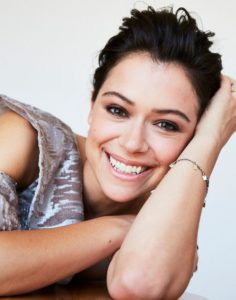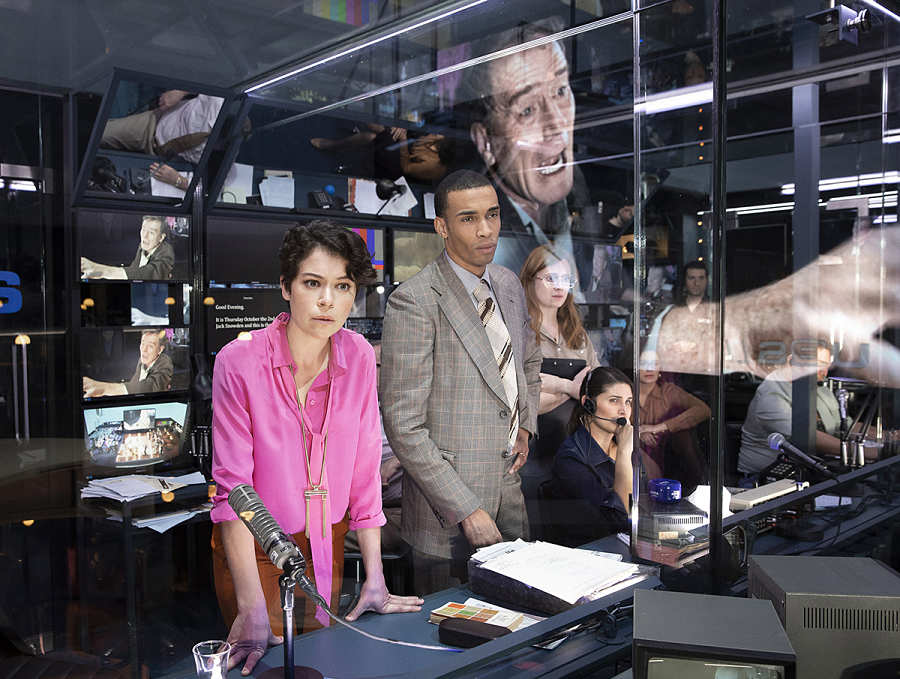Tatiana Maslany, best known for playing a troupe of wildly various clones on the sci-fi series “Orphan Black,” currently appears on Broadway in the Ivo van Hove-directed Network, in the role of Diana, the TV producer who pushes the unhinged Water Beale (played by Bryan Cranston) to prominence in pursuit of relevance and ratings.
ROB WEINERT-KENDT: The show looks like quite a workout—you’re all running all over the set all the time. How do you prepare for that?
TATIANA MASLANY: I try to stay limber and available to my body and flexible and adaptable and all of that. But I think also, when you’re working onstage, the audience puts extra energy into it too, because they’re so challenged, and they’re sitting forward or taken aback. They offer a lot of that fuel, I think.
What struck me is that Diana really comes out swinging from the jump. What do you think drives her?
When Ivo and I were working in rehearsal, he was really adamant to find the artist in her—that her way of seeing things is shaking up and potentially revolutionizing the way people are thinking about television. I think a lot of what Diana is doing is waking up something that’s dormant, or waking people up to an idea that they’ve been overlooking. She’s sort banging her head against a wall of “This is how it’s been, this is how it’ll stay,” and she tries to push them all into this new zone—for better or for worse, but she’s definitely hungry for that.
You start one scene on the street outside the theatre with Tony Goldwyn and a camera, and it’s shown on-screen in the theatre. How has that been going?
It is so exciting to be out in the world in these characters, not sort of kept safe on the stage where nothing is gonna change—it’s just so fun to be alive in the world. With that comes traffic and SantaCon and people taking selfies and dancing on the street or whatever—everything that Times Square offers. The most invasive thing is that people are sometimes recognizing Tony from “Scandal” and yelling his character’s name at his face. We’ve got a little crew on the street that’s taking care of us, making sure we’re okay, but I think the aliveness and the unpredictability of the people on the street is what makes it so fun.
The fun doesn’t end there: You two then come into the theatre and have sex at a table next to some onstage diners.
Which is the cool thing Ivo kind of constantly does: “Oh, this is the most private moment,” and he puts it in front of the audience, two feet away from audience members who are just trying to eat. He doesn’t hold anything back, nothing is sacred.
So in that sex scene—I would feel remiss if I didn’t ask about one aspect of that. I don’t know how to ask this delicately…
I can’t wait to hear how you word this.
It seems there’s a moment in which Diana helps herself, let’s say, to reach climax, and I wonder, was that your idea, or was that something that Ivo brought up?
That was my own choice, and to me it felt connected to just logistic sex stuff that I think is still taboo to talk about or show. Sometimes that’s required! It’s interesting what people read into what that says. For me, Diana is desire incarnate; she is hungry, she is getting off on herself, she’s getting off on her work, she’s getting off on her ideas, you know? She’s getting off on what she’s talking about. And that’s something she’s created. To me that’s what it is. I think it’s also a private thing that we all do that everybody somehow pretends is not happening.
I read that you did a lot of improv when you were younger. How much is that part of your process with scripted work?
I haven’t done improv for years now, but I was part of a long-term company in Canada, and I’ve done work in the States. For me the cardinal rule of “Yes, and …” feels like it can translate directly to any performance or any artistic endeavor—saying yes to the offer of the world, to the idea, to what your partner’s giving you, and then advancing it. It’s definitely something I try to bring to everything that I do, and is my favorite way to work.

On “Orphan Black,” you portrayed as many as 11 characters, like a repertory company played by one person. Was there a theatrical aspect to that work?
I definitely spoke to some friends who’ve done one-person shows, just in terms of character creation or how to define a bunch of different characters in a single piece, especially when I was learning about a new character the week before I would be playing her, because scripts were coming at a certain rate. I remember talking to one of my friends, Shawn Doyle, who’d done a play in which he played a bunch of different characters. He was talking about worldview as the nut of where a person could come from: the way they see the world, which opens up how they walk into a certain room, how they express themselves, the way they look at someone else. That all started to open up rhythm, and movement, and dance, all of that stuff that’s just so much fun to play with.
I just want to say I love your wardrobe in Network, by An D’Huys. Are those bright colors and bold shapes the kind of thing you normally gravitate toward?
No, not at all. It’s always so fun collaborating with a really visionary designer—they see the character a certain way, then they see you in those clothes, and they have a visceral response to it, and they go, “This is the right direction.” Even the way An strategized which dress when, or which outfit when, really tells the story visually in terms of Diana.
Because the show is so much about the media and the news, I want to ask, what is your media diet like?
I read the newspaper online; I don’t get a physical newspaper anymore. Also I’ve been really into reading books and essays by writers that are critical of representation and of gender; that’s really the lens through which I feel like I’m seeing the world in the last few years, really kind of eating up those ideas and that perspective, often through a feminist lens. I’ve been critical of the media since I was young; I’ve always been like, “I don’t feel like I see young girls like me on screen.” I’ve always had a bit of a critical eye on that. At the same time, I’ve been part of that machine. I’ve been an actor and I’ve taken jobs that maybe don’t reflect the way that I see the world, but a job’s a job.
Who specifically are you reading in that vein?
I mean, Jaclyn Friedman’s an amazing writer. I just read this book called Motherhood by Sheila Heti, which is incredible. I’m reading a book called A Woman Looking at Men Looking at Women, which is essays with a perceptive point of view on sex and art; it’s really fantastic, it’s by a woman named Siri Hustvedt.
I’ll just ask one more question about how theatre fits into the game plan of your career, if you have one. Going from a popular TV series to a Broadway show—I guess your co-star, Bryan Cranston, has also done it, but it’s not the most obvious path.
To me it’s so obvious somehow. I was so fortunate to be on a show that had limitless play to it, and exploration, and was never mundane. It feels like the intuitive next step to do theatre, where I get to use what I’m reading about, or what’s happening in the news, every single day as I explore this character, and that conversation starts between our story onstage and the audience’s story when they walk in. To me, it feels like a natural and very fortunate next step.


